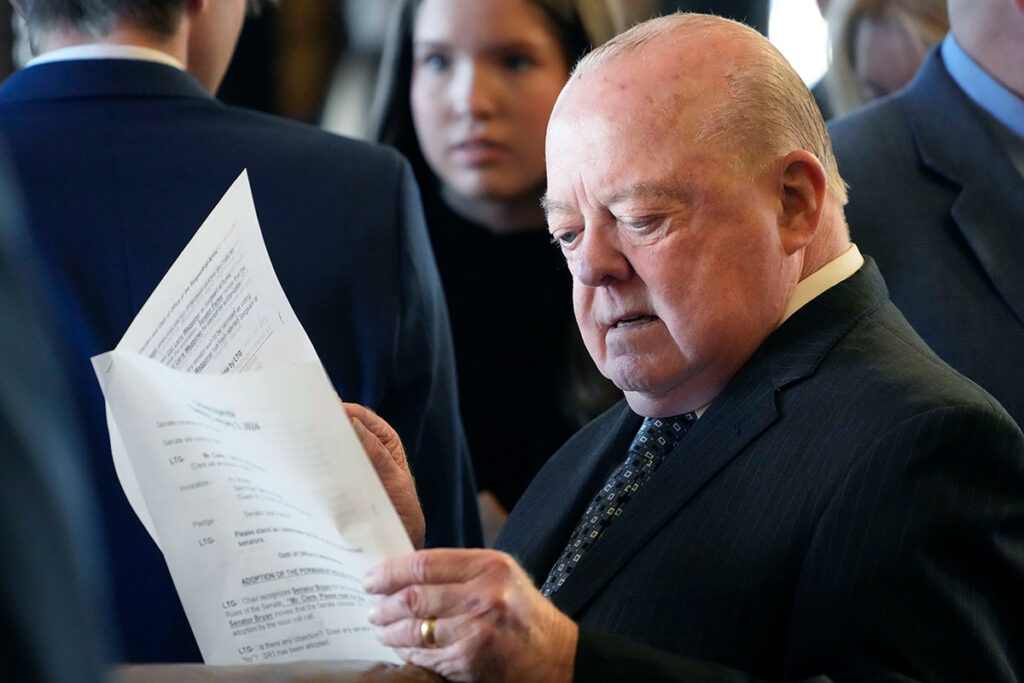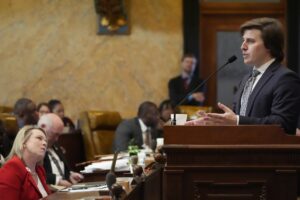An effort to close three Mississippi Universities has drawn a wave of criticism, with many fearing it could force the closure of some of the state’s historically Black universities if it became law. But it faces an imminent deadline and lawmakers say it is unlikely to become law.
Sen. John Polk, R-Hattiesburg, introduced Senate Bill 2726, calling for the Mississippi Institutions of Higher Learning to slate three public state universities for closure. If it became law, IHL would announce the names of those planned for closure by June 30, 2025, with all set to close by June 30, 2028.
Polk says Mississippi has too many universities for the number of students seeking degrees and thus suggests that closing three universities would be fiscally responsible.
“If you took the appropriations of the three lowest universities right now and moved $85 million to the five universities,” Polk told WAPT reporter Ross Adams. “It certainly would enhance the ability for our students to get a good education.”
Senator Polk did not return calls to the Mississippi Free Press by press time.
In response to a Mississippi resident on Facebook, Mississippi Sen. Hillman Frazier, D-Jackson, who serves on the Senate Universities and Colleges Committee, said he was “certain that Senator Polk’s bill will not be called up for a vote.”
“Similar bills have been introduced in the past only to die in a committee,” he wrote. “Senator Polk’s bill does not name any institutions but leaves it to IHL to make a recommendation to the Mississippi Legislature by 2025. Past bills targeted (Mississippi University for Women, Mississippi Valley State University and Delta State). To be clear, the Senate Universities and Colleges Committee has no desire (to) close any institution of higher learning. I discussed this matter with the chair of the committee and we are on the same page.”
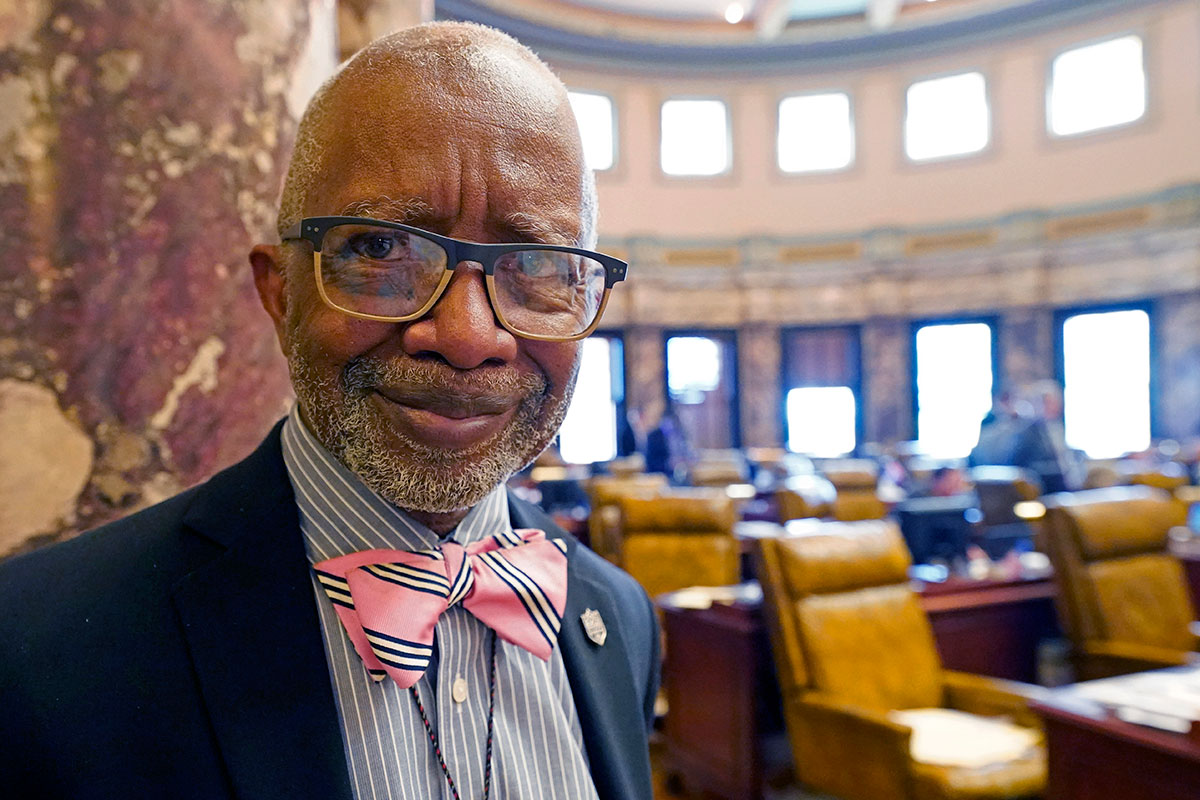
The Mississippi Free Press could not reach Sen. Frazier by press time.
The bill would require IHL to consider several factors in the selection of schools to be closed, including “enrollment data and degree attainment percentage,” the “institution’s economic impact on the local community, region and state,” and “any additional purposes that the institution currently serves to the state and its citizens, including providing medical services, agriculture research, or engineering research or services.” IHL would also be required to host at least one listening session at every university.
The bill includes provisions to allow programs at closed universities to be reestablished at other institutions.
Calls to reject the bill have mounted. Mississippi Votes started a petition on Change.org that had gathered nearly 12,000 signatures by press time. The petition notes that the bill does not factor in the socioeconomic role universities play in many communities where they are often one of the largest employers. The petition also states the “impact of this bill will not only limit access to higher education but also have severe economic implications on the areas directly tied with these institutions. Historically Black Colleges and Universities are particularly at risk – a fact that adds an additional layer of concern.”
Mississippi’s dedication to deliberately underfunding black institutions as cited in 1868 & 1890 with the reallocation of Land Grant funds from Alcorn State University to Mississippi State University is a fact! Here is more information on Senate Bill 2726! #MSVotes #MSV #MSLeg pic.twitter.com/7smZchKJYS
— Mississippi Votes #StayVocalActLocal (@MSVotes) February 27, 2024
Mississippi Votes noted in a tweet on Feb. 27 that the measure could potentially close Alcorn University—an HBCU that is Mississippi’s only agricultural science and research university, boasts the state’s only majority Black nursing school, and is the only institution of higher learning in the southwest part of the state. Mississippi Votes warned that the bill “potentially targets Historically Black Colleges and Universities and the complete erasure of their history.” The organization encouraged residents to call the Senate Universities and Colleges Chairs to voice their concerns.
Jackson State University officials referred all questions about the bill to IHL. IHL did not respond to a request for comment.
The National Alumni Association presidents for Alcorn State University, Jackson State University and Mississippi Valley State University sent a letter to lawmakers asking them to decline the bill. The letter said the passage of the bill would represent “a devastating blow to the legacy of education and opportunity within the state of Mississippi.”
“These institutions are economic engines, generating jobs and stimulating local economies,” the letter said. “They are the centers of research and innovation, tackling some of society’s most pressing challenges. Most importantly, they are beacons of hope and possibility, transforming lives and empowering generations of Mississippians to achieve their full potential.”
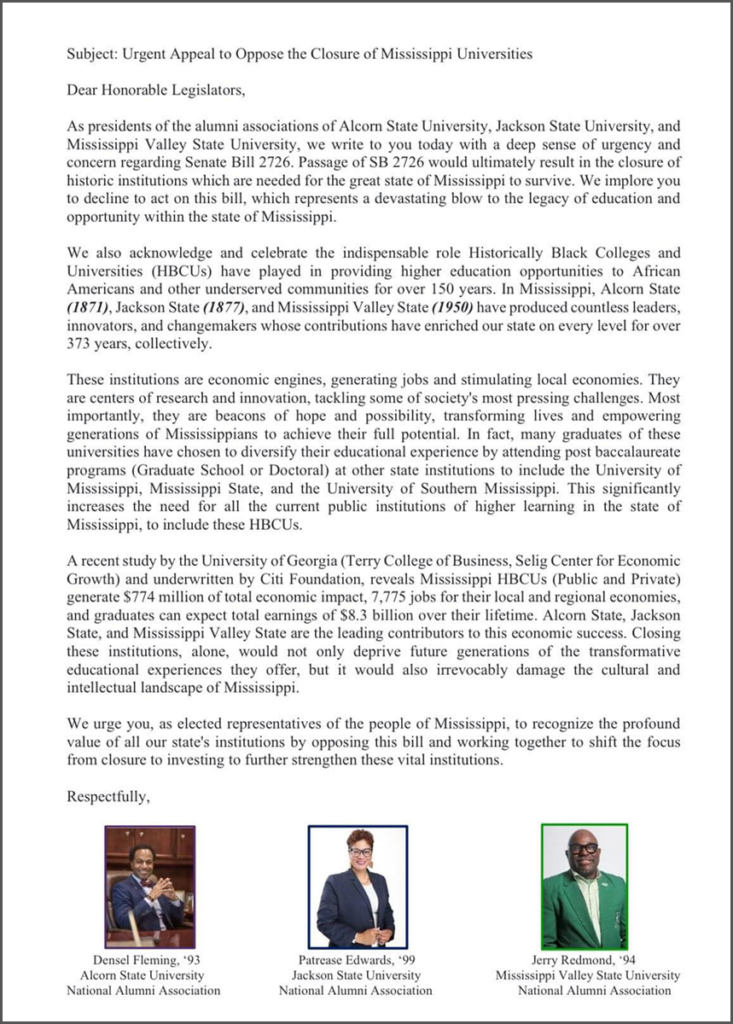
HBCUs are not the only universities raising concerns about the bill. An editorial column published in the Columbus-based Commercial Dispatch called for Mississippi University for Women graduates to rally against the proposal. The column pointed to the institution’s declining enrollment and the recent loss of support for the university’s proposed name change as potential signs that MUW could be on the chopping block if S.B. 2726 became law.
“With the second lowest enrollment of 2,227 (just 31 students more than Mississippi Valley State) and its close proximity to Mississippi State (25 miles), (the bill criteria) makes it an obvious target for closure,” the article said.
MUW President Nora Miller told the Mississippi Free Press on February 27 that she believes the bill was created to address the worsening enrollment decline.
“S.B. 2726 seems to be in response to the nationwide enrollment cliff caused by declining population growth over the past two decades,” Miller said. “Institutions are looking at ways to cut costs, implement efficiencies and reach educational attainment goals for the State of Mississippi. This bill lists several key performance indications that are reviewed at both the institutional level and at the system level.”
Data from the Mississippi Institutions of Higher Learning shows a decrease of nearly 5,400 students across the state’s eight public universities between 2019 and 2023. Delta State University and the University of Southern Mississippi have experienced the largest student enrollment declines. Only Mississippi State University and the University of Mississippi/University of Mississippi Medical Center have enjoyed enrollment gains.
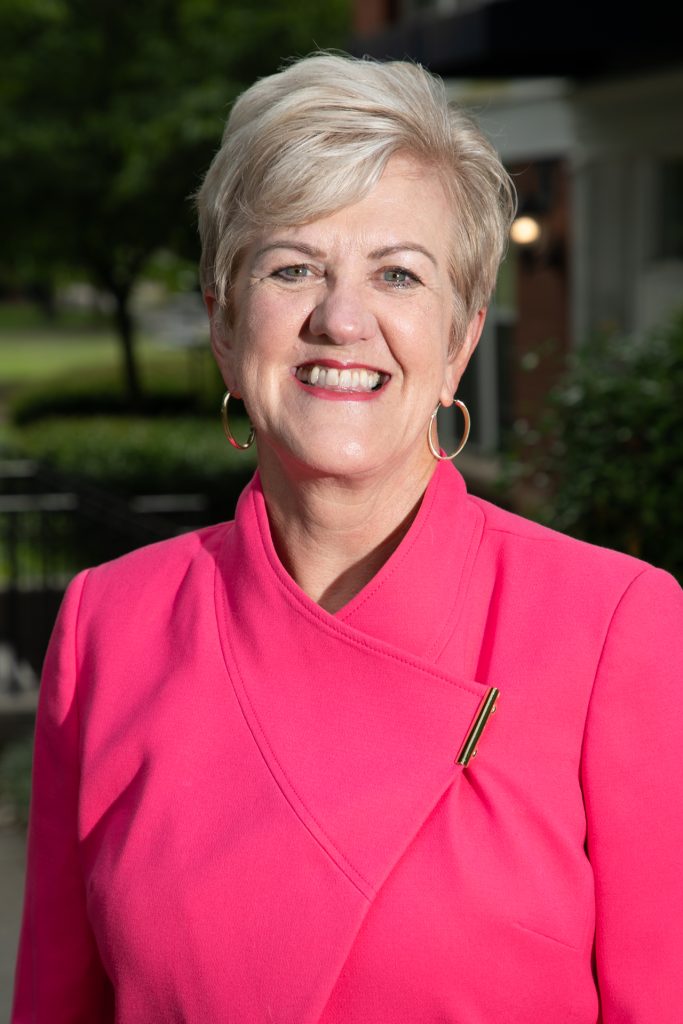
Miller noted that MUW has performed well on many of the indicators listed in the bill including leading the Institutions of Higher Learning System with the highest percentage of Mississippi residents enrolled, awarding degrees at a rate 42% higher than the IHL system—32% higher than the next highest university in the system. She said MUW added $215.3 million in income to the Mississippi economy in 2022.
The bill is currently in the Senate Universities and Colleges Committee. It must advance out of the committee by Tuesday, March 5, to survive a legislative deadline. Even if the bill did advance and pass in the Senate, it would still need approval in the Senate before it could go to the governor to sign it into law.


